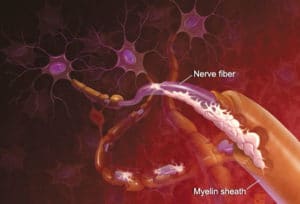Multiple Sclerosis
- What is Multiple Sclerosis?
- Is there a known cause of Multiple Sclerosis?
- What are the most common symptoms of MS?
- Who gets Multiple Sclerosis?
- Why do doctors think I’m imagining my symptoms?
- Am I going to end up in a wheelchair?
- What options can help me?
- Does diet affect Multiple Sclerosis?
- Does stress affect Multiple Sclerosis?
- Can I get pregnant with Multiple Sclerosis?
What is Multiple Sclerosis?
Multiple Sclerosis, commonly known as MS, is an inflammatory disease that scars the myelin sheath, which is what protects nerves in the body, including the brain and spinal cord. This disrupts nerve communication, which in turn can create neurological issues and impairments.
An individual with MS may experience varying degrees of neurological impairment, depending upon the location and extent of the scarring. There is no cure for MS at this time, although the research of this disease is ongoing.
[Top]
Is There a Known Cause of Multiple Sclerosis?

No one specific cause has been identified yet, but there are a few theories. MS could be an auto-immune disease, in which the body’s immune system begins to attack normal body tissue or the myelin-producing cells. Studies suggest there may be a triggering factor of some sort, such as a virus.
A higher incidence of MS is found in the Northern temperate zones of North America and Europe, which may indicate a triggering environmental factor. In other words, a specific toxic or vitamin deficiency may cause MS to manifest in those who may be more genetically predisposed to developing MS.
Multiple Sclerosis is not transmitted genetically, although research indicates an increased susceptibility to autoimmune diseases may be partly genetic.
[Top]
What are the most common symptoms of MS?
Symptoms will vary from person to person. Not everyone experiences MS in quite the exact same way. The symptoms that occur are determined by the location of the nerve lesion and damage. Symptoms may also range from mild to severe.
Commonly reported symptoms include:
- Fatigue
- Weakness
- Impaired movement
- Balance problems
- Neurogenic bladder and bowel
- Numbness or tingling
- Vision loss
- Tremor
- Vertigo
In addition, urinary incontinence can sometimes be a side effect of living with MS.
If you are not sure you have MS, don’t be afraid to ask questions and discuss this further with your doctor.
[Top]Who gets Multiple Sclerosis?
According to the National MS Society, over 2.3 million people across the world are diagnosed with Multiple Sclerosis. It appears more commonly in women than in men, and 90% of MS patients are diagnosed between the ages of 16 and 60.
MS is also more common in whites than in Hispanics or African Americans and is relatively rare among Asians and certain other groups.
[Top}
Why do doctors think I’m imagining my symptoms?
 Multiple Sclerosis is sometimes known as an invisible illness. In other words, the symptoms, such as numbness, tingling, and fatigue, may not always be obvious to those around you.
Multiple Sclerosis is sometimes known as an invisible illness. In other words, the symptoms, such as numbness, tingling, and fatigue, may not always be obvious to those around you.
On top of that, in the first stages of Multiple Sclerosis, diagnostic tests, such as MRI’s, may come back negative, which may lead a healthcare practitioner to believe there is no illness.
A clinical diagnosis of MS may take a long time. Often, a doctor will want to observe you over a period of time before reaching a final diagnosis. Neurologists are generally requested to consult. In later stages of MS, diagnostic tests may help with a final diagnosis too.
If you believe you may have MS, it’s best to get an appointment scheduled with your Primary Care Physician (PCP) or a specialist. Don’t be afraid to ask questions, especially when it comes to your health.
[Top]
Am I going to end up in a wheelchair?
It may ease your mind to know that more than two-thirds of those living with MS are still walking 20 years after developing the disease. In addition, 40% of those diagnosed with MS can still go about their normal daily activities with little disruption or trouble, and 75% never need a wheelchair.
In other words, with appropriate management of MS, you may be able to maintain your mobility and independence.
[Top]
What options can help me?
Early treatment makes a difference. Your doctor will be the best source for finding an option that works best for you. Physical therapy, exercise, lifestyle changes such as diet, and alternative therapies may be of interest as well.
Intermittent catheterization can also help out if you have symptoms of neurogenic bladder, urinary incontinence, or bladder retention. Talk to your doctor to see if this is the right course of treatment for your symptoms, and then contact 180 Medical. We’ll take the worry out of getting your catheters and incontinence supplies.
[Top]
Does diet affect Multiple Sclerosis?
Diet does not seem to suppress flare-ups, and it cannot improve the re-myelination of already damaged nerves. However, it’s important to note that adjusting your diet and water intake may help with skin issues, overall health, and even bowel and bladder issues for those with severe MS.
[Top]
Does stress affect Multiple Sclerosis?
While stress may not directly impact MS, it’s a good idea to take an active role in achieving a more healthy mental state. For example, attending therapy or counseling may be a great way to relieve some stress and address issues that weigh you down. In addition, yoga, massage, meditation, biofeedback, and music therapy are great stress-relievers for anyone.
[Top]
Can I get pregnant with Multiple Sclerosis?
For a woman with MS, the decision to have a baby can be more difficult. MS will not hinder a woman’s chance of becoming pregnant or carrying a child to full term. However, the decision to have a baby can be a difficult one, understandably. Ideally, begin planning in advance and talk with your doctor to get the information you need to make your decision.
[Top]
More Multiple Sclerosis Resources
For further information, support groups, and more resources, please check out the websites listed below:
National MS Society
Dedicated to supporting research for treatment and cures as well as helping those living with MS. Check out their Walk MS events to find one near you and participate.
Multiple Sclerosis Connect
Online community with updated information and support systems, includes news, reviews of products, and various videos.
MS Connection
Online community with an emphasis on learning from others with MS, sharing your stories, and connecting with others in discussions and groups to give and get support
180 Medical Blog – Multiple Sclerosis
Where to Get Catheters and Incontinence Supplies for MS
In addition, if you require the use of intermittent urinary catheters or incontinence supplies to manage the symptoms of Multiple Sclerosis, 180 Medical is a reliable supplier ready to help and support you.
Our caring staff of specialists will treat your concerns with the dignity and kindness you deserve because we understand you’re already going through a hard time.
Contact us today to experience the renowned customer service and reliable support for which 180 Medical is known and preferred.
Disclaimer: The information here was provided and sourced in part by the MS Foundation. This information does not constitute medical advice for any individual. As specific cases may vary from the general information presented here, please consult a qualified healthcare professional.